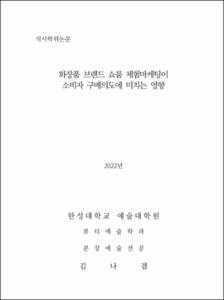화장품 브랜드 쇼룸 체험마케팅이 소비자 구매의도에 미치는 영향
= The Effect of Cosmetic Brand Showroom Experience Marketing on Consumer Purchase Intention
- Type
- Thesis
- Advisor
- 황수민
- Department
- 예술대학원 뷰티예술학과
- Issued Date
- 2022
- Publisher
- 한성대학교 예술대학원
- Keyword
- 쇼룸; 화장품 브랜드 쇼룸; 쇼룸의 인지도; 체험마케팅; 소비자 구매의도
- Files in This Item:
-
-
Download
 200000594527.pdf
기타 데이터 / 3.55 MB / Adobe PDF
200000594527.pdf
기타 데이터 / 3.55 MB / Adobe PDF
-
Items in Repository are protected by copyright, with all rights reserved, unless otherwise indicated.